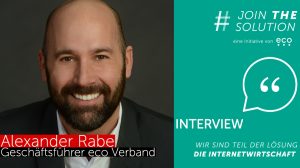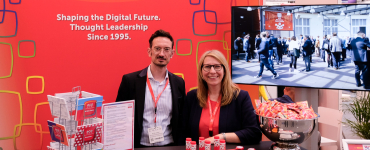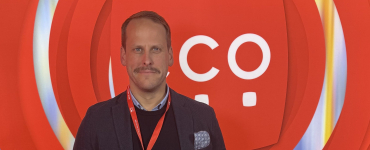eco has just launched a campaign website under the motto of “JOINTHESOLUTION: We are part of the solution – the Internet industry”. The campaign focuses on digital technologies and services that provide solutions to burning societal issues such as climate change, the sustainable use of resources, food and nutrition safety or the early identification of life-threatening diseases.
We spoke with eco’s Managing Director Alexander Rabe about the digitalisation’s potential to achieve sustainability goals, the central importance of digital infrastructures, political framework conditions and opportunities for participation by eco member companies.
With the launch of the eco campaign “JOINTHESOLUTION: We are part of the solution – the Internet industry”, a particular focus has been paid to companies that form the foundation of the Internet value chain – namely, operators of digital infrastructures such as data centres or colocation providers. To what extent are digital infrastructures and data centres part of the solution for achieving the sustainability goals?
Alexander Rabe: For many years now, operators of digital infrastructures have been advocating for more energy efficiency and sustainability. As a result, in international comparison, data centres in Germany are already among the most energy-efficient. The fact is that, despite rising demands, the CO2 emissions of European data centres have been declining for years. Likewise, the energy consumption per computing unit is about twelve times lower today than it was ten years ago. Migration to the cloud is particularly worthwhile, as significant effects can be achieved in terms of energy savings compared to locally operated servers in the company.
What’s more, the modernisation of digital infrastructures also has a positive effect on the energy balance: Fibre-optic cables require around five times less energy than copper cables, while 5G mobile communications can increase energy efficiency by up to 80 per cent compared to 3G and 4G. These figures are clearly impressive.
Enormous positive effects on the overall balance regarding energy consumption and costs are achieved by innovative solutions in cooperation with energy suppliers – for example, through the waste heat utilisation of data centres, or hosting in wind turbines.
Last but not least: data centres are the backbone of digitalisation and enablers of further technological applications in the domains, which in turn have a positive impact on Germany’s and Europe’s CO2 balance. By optimising traffic flows in urban car traffic alone, connected mobility is likely to save up to 50 per cent of CO2 emissions by 2030. Just one day of working from home per week, for example, can lead to at least 1.6 million tonnes of CO2 being saved per year in Germany. What is also significant is the efficiency boost and thus the energy savings potential in the manufacturing industry and logistics brought about by digital technologies and applications.
What do policymakers need to do to shape sustainable digitalisation?
Rabe: The simultaneous roll-out of efficient digital infrastructures and renewable energies is a prerequisite for achieving the climate goals and thus the targeted CO2 reduction via digitalisation. Policymakers must therefore create effective framework conditions for a greener future. For example, in order to ensure that the climate-neutral data centre operation is anchored in the coalition agreement, the energy transition in Germany must be accelerated; as soon as possible, we need a significantly higher share of energy from renewable sources than is currently available on the market.
In addition, approval processes and procedures for the construction and modernisation of data centres must be significantly streamlined and new locations for digital infrastructure operators must be seen as an opportunity for a sustainable future.
If we want to reduce energy costs and CO2 emissions, the utilisation of waste heat from data centres will definitely be one of the best practices in the coming years. To achieve this, however, operators must be given more support in connecting to local and district heating networks. It has been calculated that it would be possible to supply all office buildings and apartments in Frankfurt with waste heat from data centres as early as 2030. This makes the immense potential of this approach strikingly clear.
In practice, a pilot project underway by Mainova and Telehouse in Frankfurt shows what is possible. From 2030, around 1,300 new residential buildings and commercial units will be supplied with at least 60 per cent of the waste heat from the neighbouring data centre.
Digital infrastructures therefore constitute the backbone of sustainable digitalisation and are a prerequisite for further digital services and technologies for more sustainability and CO2 savings. To what extent will these be included in the campaign?
Rabe: The aim of our campaign is to show a holistic picture of the sustainability potential through digitalisation. The motto “We are part of the solution – the Internet industry” describes it perfectly: without the digital and Internet industry, we will no longer be able to achieve our climate goals.
The current launch of the initiative’s landing page is the first step; going forward, eco will continue to promote the positioning of the Internet industry as part of the multifaceted solution in dealing with challenges such as climate change.
It is important to understand digital technologies and applications as a tool and as a means to achieve the climate goals – that is our mission in 2022.
We are currently working with Arthur D. Little, for example, on a keynote paper that will illustrate the positive impact of digitalisation through solid analysis and illustrative best practices. We will also discuss the current challenges of the industry in leveraging the opportunities for more sustainability with political decision-makers and leaders of the Internet industry in hybrid event formats.
An additional element of our planning is the continuation of our reportage series, to be conducted by the RBB reporter, Sven Oswald. From a topical perspective, we will also roll out the campaign to include solutions from the world of work such as Industry 4.0, as well as approaches to increasing urbanisation such as sustainable mobility concepts or Smart Cities. We would like to take this opportunity to cordially invite eco member companies to enter into an exchange with us on opportunities to take part and to become involved in the campaign as part of the solution to addressing societal challenges.
Thank you very much for the interview, Mr Rabe.




